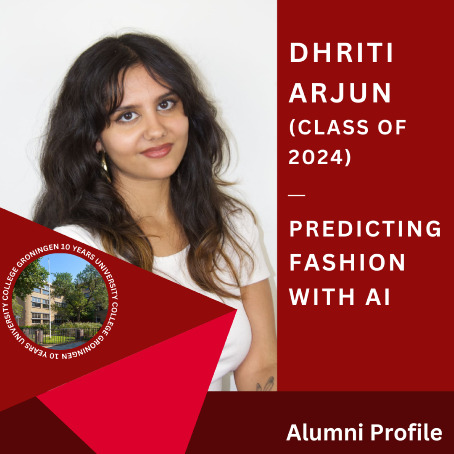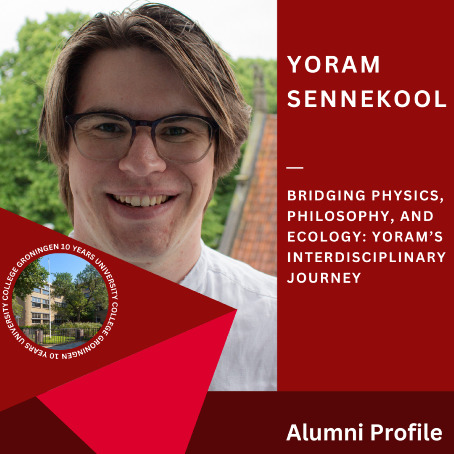Alumni Stories
UCG seeks to engage it's alumni fully in the life of the College as valued supporters, advocates and lifelong learners who contributes to and benefit from connections to each other and to UCG.

In this interview, our UCG alumna Dhriti Arjun reflects on her unique academic path, which integrated programming, data science, and psychology, and shares her eagerness to tackle real-world challenges, particularly in sustainable fashion. She also discusses her time at UCG, her valuable internship experience at Fractal, and the lessons she learned along the way.
As part of your UCG major, what courses did you take, and how did they shape your academic path?
During my time at UCG, I took a combination of programming, data science, and psychology courses. I focused on Machine Learning, Python, Advanced Programming, Big Data, and Computational Methods, which deepened my understanding of computer science topics. On the psychology side, I studied Cognitive Psychology, Biopsychology, Human Error, and Philosophy of Mind to explore how human cognition works. This blend was important because many machine learning methods are based on teaching machines to learn in ways that mirror human learning processes. The psychology courses provided me with a foundational understanding of the algorithms used in machine learning.
What were your career goals as a student?
After completing these courses, I wasn’t sure if I would be able to apply these skills in an industrial context. So, I decided to do an internship as part of my UCG core in my third year. I worked with a multinational company called Fractal, which focuses on data analytics and AI. I joined a small team of researchers who were using psychology and neuroscience in decision-making to help client companies optimize marketing campaigns. When I was on board, they were experimenting with generative AI to enhance design choices, which sparked my interest in understanding the psychology of marketing and consumer psychology.
What impact did your internship have on your career interests, and how did it shape your future goals?
My internship experience led me to explore how marketing could be combined with machine learning, especially in the context of fashion trends, a personal interest of mine. I noticed that fashion trends are rapidly changing, with shorter lifespans, and I realized that nobody had really thought about trend forecasting using AI and Machine Learning to optimize it. The core issue I wanted to address was overproduction and the resulting pollution in the fashion industry. I wanted to create a hypothetical model that could predict the rise and fall of fashion trends to help accurately determine production needs. Though challenging at first, I received a lot of support from my supervisor and teachers at UCG, which allowed me to create a comprehensive end-to-end model. I’m now returning to Fractal to continue my research internship.
Looking back, how do you feel about the path you chose, and would you recommend it to others?
I’m really glad I chose this specialization because it offers a wide range of future opportunities. Whether I decide to continue in programming, data science, AI, or marketing, my background in AI and psychology gives me a strong foundation. I highly recommend this path to other students because it opens doors to various industries and career paths, especially in fields that are evolving as quickly as AI and marketing.
Connect with Dhriti on LinkedIn

In this interview, we catch up with Yoram Sennekool, a University College Groningen (UCG) alumn, who shares how UCG’s interdisciplinary Liberal Arts and Sciences program shaped his unique academic path. Drawn to UCG’s welcoming environment and flexible curriculum, he majored in physics while exploring philosophy and biology, which led him to pursue two master’s degrees and a future career in theoretical ecology.
Yoram reflects on how courses like philosophy of physics and self-directed projects helped him connect disciplines and explore new research areas. Now applying to PhD programs, he offers valuable advice to prospective students about building strong foundations and embracing the benefits of interdisciplinary learning.
What was your major at UCG, and what drew you to study Liberal Arts and Sciences?
During my first visit to UCG, I was immediately impressed by the homely environment, friendly faces, and academic program which inspires interdisciplinary interests. It was the perfect fit for my interests and personality, and I ended up majoring in physics with additional courses in philosophy and biology.
Were there any particular subjects or courses that you found especially exciting or impactful during your time at UCG? Why?
In my second year, I took Sean Gryb’s class on philosophy of physics, which introduced a perspective on physics that I didn’t even know existed. Through the philosopher’s lens, the most foundational questions of physics became both tangible and meaningful for me. In my last year, Bettina van Hoven and Sonia Mascarell organized a small, highly self-directed course to explore the frontiers of research. Their guidance gave me the confidence to reach out to academics in Oxford and I started participating in their research seminars.
How did your time at UCG shape your interests or career path? Did it influence any unexpected directions?
My work with Sean Gryb got me interested in a career in philosophy of physics. His guidance led me to pursue my two master’s degrees in philosophy of physics and theoretical physics. During my time at UCG, I also briefly explored complex systems and chaos theory. When I unexpectedly found my motivations for studying shifting two years ago, that brief exploration piqued my interest in mathematical approaches to environmental science. Those interests and motivations have since turned into an ambition to study how species can assemble into and coexist in ecosystems.
What did you do after graduating from UCG? How did your Liberal Arts and Sciences degree help you take the next step?
The multidisciplinary character of UCG uniquely prepared me to study philosophy of physics, where a combined background in physics and philosophy is the strongest preparation you could have. Having completed my first master’s in philosophy of physics at the University of Oxford, I am now in the last year of my second master’s in theoretical physics at Utrecht University. I have since become dedicated to applying my quantitative background to ecology. The liberal arts degree helped me position myself effectively in multidisciplinary spaces, allowing me to formulate why my unique background prepares me for the task at hand.
In what ways did the interdisciplinary nature of your UCG education prepare you for your professional life? Were there any specific skills or experiences that proved particularly valuable?
Since my first day at UCG, my education has always been oriented towards bridging disciplines or utilizing skills between disciplines. Whether a philosophical perspective on fundamental physics or a mathematical approach to ecology, UCG has provided me with a broad basis of knowledge and the communication skills necessary to bridge disciplines.
Looking back, what were some of the most memorable or meaningful moments you experienced at UCG? How did they shape who you are today?
My friends at UCG made the whole undergraduate experience both memorable and meaningful. They inspired me to develop and challenge myself, and to explore my interests. And even now, years down the road, their warm kindness and impressive achievements inspire me to be the best version of myself. UCG’s strength has always come from the ability of its faculty and staff to create an environment in which students (and staff and faculty) can inspire each other. That shapes not only who we are, but also defines what UCG is.
What advice would you give to current or prospective students considering UCG?
One of the most valuable skills you can gain from UCG is the ability to position your unique self and to be adaptable in diverse and changing environments. Each student has an invaluable background, skillset and base of knowledge that is unique to them. You will need to learn to communicate the value and strength in that to others, and to find - or even create - a niche that fits you. The stronger your foundations are in whatever fields you’ve gained expertise in, the better you are in a position to do that.
What are your goals for the future? How do you see your UCG experience helping you achieve those goals?
This year, I am applying to PhD programs in theoretical ecology in which I will use my background in physics and biology to create mathematical models of ecosystems and develop ecological theory. I am undecided what I will do after. If I decide to leave academia, I will likely turn to data science, building on my mathematical basis, research skills, and communication skills to gain insights from mathematical models and datasets. If I stay in academia, I am certain that the teaching experiences at UCG will be absolutely invaluable as I start teaching.
If you could go back and give your younger self one piece of advice before starting at UCG, what would it be?
As a liberal arts student in Europe, you will most likely have a less comprehensive intradisciplinary education than most. You won’t know quite as much about history as a history student, or about biology as a biology student. That’s why I would advise my younger self to spend additional effort to understand and know the foundations of your chosen discipline(s). As a liberal arts student, you are responsible to ensure that your foundations are secure and rigorous. Doing so makes it easier to cross disciplinary boundaries and saves many headaches down the road.
| Last modified: | 21 October 2024 4.29 p.m. |
